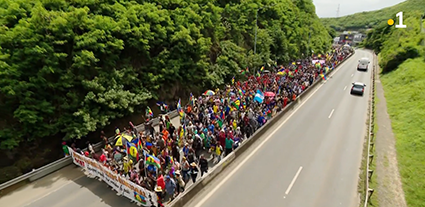There were two demonstrations in Nouméa on Thursday 28 March. One was organised by loyalists, the other by independentists.
There were between two and three thousand non-independence supporters (5,000 according to the organisers). This is a relatively large number for a demonstration organised during the week in a small country with a population of 270,000.
The loyalists want the electorate to be “unfrozen”. At present, not everyone can vote in local elections. The issue is complex. It can be summed up by saying that people who have recently arrived from France do not have the right to vote. Loyalists would accept a period of ten years’ presence before being given the right to vote.
Loyalists are backed by Gérald Darmanin, Emmanuel Macron’s interior minister. He has proposed that the French Parliament vote for the thaw.
Tension mounts
The pro-independence movement is refusing to accept the thaw. They also gathered several thousand people on Thursday (figures vary from 1,000 to 5,000…).
They fear that thousands of people will arrive from France. This could result in the Kanaks becoming a minority in New Caledonia. They would then no longer be able to gain independence by voting. One of the two main pro-independence parties, the Palika, is not opposed to this ten-year period, subject to certain conditions. The Union calédonienne, the oldest pro-independence party, is firmly opposed. Tensions are mounting.
The French parliament is more measured…
Speeches on the subject in New Caledonia are becoming increasingly violent. Sonia Backès, leader of the right in New Caledonia, made a shock statement on Thursday: “I say this to all the parliamentarians who are trembling and afraid that things will get messy in New Caledonia: things will get messy if anyone tries to step on us! That’s enough now!
Loyalists fear the French Parliament. The President of the Republic, Emmanuel Macron, does not have a majority in the National Assembly. It is therefore not certain that this text will be voted through.
The strategy of the two camps
The strategy of the loyalists is to present the independentists as undemocratic, since they reject the principle of one man, one vote. Some elected representatives have even spoken of terrorism.
The strategy also consists of denouncing the policies pursued by the independentists over the three years they have been in government. Loyalists accuse the independents of creating unbearable taxes for New Caledonians at a time of serious nickel crisis. This demonstration was organised after several days of blocking fuel supplies. Loyalists and associations denounced the creation of a tax on fuel.
The pro-independence strategy is to threaten the French state with withdrawal from the institutions if the thaw is voted through. The pro-independence parties would then not field any candidates in the important elections at the end of the year. This would be the beginning of escalation… as was the case during the violent events of the 1980s.
Photo caption: the procession of the pro-independence demonstration in Nouméa




